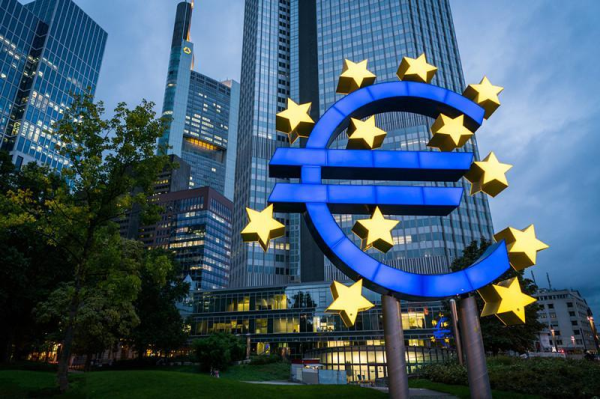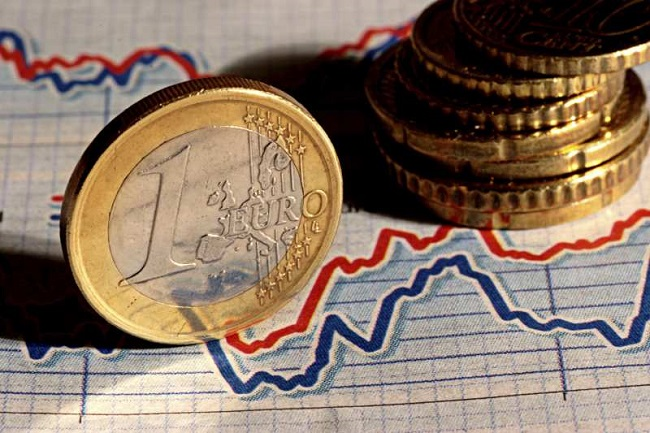
In 2023, the economic index of all major economies in the world is upward and stable, but the European economy is weak on all sides. Looking at the world, while the U.S. and Japan's economic growth exceeded expectations, the economic performance of Europe, also a developed economy, continued to be sluggish and weak far more than the market expected. Looking back at 2023, the weakness of the European economy is comprehensive, industrial output on the supply side continues to decline, and the upward momentum of internal and external demand on the demand side is also obviously missing, and the GDP growth rate of the eurozone as a whole has continued to hover near zero. And Germany, long the locomotive of the European economy, has fallen into recession, making it difficult to repair. So why is Europe's economy falling behind?
According to some of the current data, consumption is Europe's weak spot. In fact, since the epidemic, the recovery of eurozone residents' consumption has always been weak, and it has become the core drag on the European economy this year. From the three driving factors of consumption: income, savings and willingness, it is found that: First, the more moderate rise of income in the eurozone is an important factor in the consumption divergence between the United States and Europe, mainly due to the weak wage bargaining power of European workers. Secondly, the sources of excess savings accumulated in Europe and the United States since the epidemic are different. The excess savings of European residents are mainly from throttling, while the excess savings of American residents are mainly from government subsidies, and the scale of excess savings of European residents is much smaller than that of the United States. Finally, there are differences in the willingness to consume in Europe and the United States. European residents are more inclined to use their excess savings for investment than consumption.
Behind the weak consumption, fiscal policy is the root cause. Behind the divergence of household consumption growth, the root cause is the difference in the intensity and direction of fiscal policies in the US and Europe. In terms of intensity, the scale of fiscal expenditure of European countries after the epidemic is difficult to match that of the United States. In terms of direction, European countries have always attached great importance to the dependency of employees and employers, and their fiscal expenditure has mainly directly supported enterprises, while the United States has provided a lot of additional support for residents, which has enabled the rapid repair of the labor market in Europe and the slow rise of residents' income after the epidemic. In addition, the impact of energy in Europe is more intense, resulting in a significant difference in the focus of fiscal policies in Europe and the United States, and the European finance is more busy to deal with the energy crisis.

Fiscal policy is at the heart of Europe's economic weakness, so why are fiscal problems so persistent in Europe? There are three reasons. First, under the unified monetary policy and decentralized fiscal system, the eurozone countries with uneven development face many constraints such as institutional constraints and uneven development among countries. Second, the fiscal rules proposed by the EU have not significantly reduced the debt levels of member states, but have led to a widening gap between countries. Third, politics is also shaping Europe's economy, with national policies plagued by partisanship, a consequence of the unexpected fiscal crisis in traditionally spendthrift Germany.
Reforms will take time, and economic vulnerabilities have been exposed. Fiscal policy faces many constraints, and the counter-cyclical adjustment capacity of eurozone countries is relatively weak. On the one hand, many European countries not only worry that the expansion of fiscal expenditure will offset the efforts of monetary tightening to fight inflation, but also hope to ease the debt burden and gradually return to the fiscal rules that will be restarted. On the other hand, the EU is also vigorously promoting the fundamental reform of fiscal rules and strictly supervising countries to reduce deficits and carry out fiscal consolidation. European countries have opted for fiscal neutrality so far this year. Looking ahead, Europe may find it difficult to undertake large-scale fiscal spending: first, high interest rates increase the risk of national debt repayment, second, Europe's fiscal rules are about to come into force, and third, Germany and some low-debt countries in northern Europe are strongly opposed to borrowing, making countercyclical adjustment difficult to start.
In summary, Europe's weak economic performance this year is the result of deficiencies in fiscal institutions, reforms will take time, and economic growth pressures remain high. The internal resilience of the European economy is fragile, and the fiscal pain is particularly difficult to solve. Future reforms must address weak execution and large deficit gaps at the union and national levels, one by one, and establish good interaction between the state and the union. However, it will take time to solve this problem, and in the short term, faced with challenges such as high inflation, high interest rates and geopolitical risks, the European economy still has considerable downward pressure.

From December 4th to 5th, 2025, Russian President Vladimir Putin set foot on Indian soil again after a four-year hiatus to attend the 23rd annual India-Russia summit.
From December 4th to 5th, 2025, Russian President Vladimir …
At a critical inflection point for the global autonomous dr…
Following a meeting last week between Polish Prime Minister…
The AI race in 2025 is playing out like an absurd drama: Je…
In the globalized trade system, the efficiency of ports as …
The Tokyo Metropolitan Police Department of Japan recently …